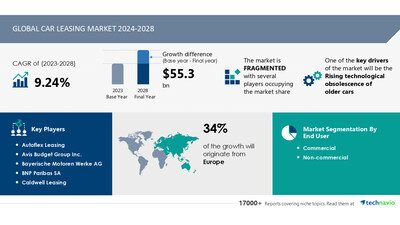NEW YORK, Sept. 26, 2024 /PRNewswire/ — Report on how AI is driving market transformation- The global car leasing market size is estimated to grow by USD 55.3 billion from 2024-2028, according to Technavio. The market is estimated to grow at a CAGR of 9.24% during the forecast period. Rising technological obsolescence of older cars is driving market growth, with a trend towards off-lease cars fueling used car market. However, limited customer awareness and acceptance in semi-urban and rural areas poses a challenge. Key market players include Autoflex Leasing, Avis Budget Group Inc., Bayerische Motoren Werke AG, BNP Paribas SA, Caldwell Leasing, Deutsche Leasing AG, Enterprise Holdings Inc., Executive Car Leasing Co., ExpatRide International Inc., Hertz Holdings Inc., International Car Lease Holding, LeasePlan Corp. NV, Masterlease Group, Mazda Motor Corp., Mercedes Benz Group AG, Orix Corp., Porsche Automobil Holding SE, SIXT SE, Societe Generale SA, and Zoomcar India Pvt. Ltd..
Key insights into market evolution with AI-powered analysis. Explore trends, segmentation, and growth drivers- View the snapshot of this report
|
Car Leasing Market Scope |
|
|
Report Coverage |
Details |
|
Base year |
2023 |
|
Historic period |
2018 – 2022 |
|
Forecast period |
2024-2028 |
|
Growth momentum & CAGR |
Accelerate at a CAGR of 9.24% |
|
Market growth 2024-2028 |
USD 55.3 billion |
|
Market structure |
Fragmented |
|
YoY growth 2022-2023 (%) |
7.84 |
|
Regional analysis |
North America, Europe, APAC, South America, and Middle East and Africa |
|
Performing market contribution |
Europe at 34% |
|
Key countries |
US, China, UK, Germany, and France |
|
Key companies profiled |
Autoflex Leasing, Avis Budget Group Inc., Bayerische Motoren Werke AG, BNP Paribas SA, Caldwell Leasing, Deutsche Leasing AG, Enterprise Holdings Inc., Executive Car Leasing Co., ExpatRide International Inc., Hertz Global Holdings Inc., International Car Lease Holding, LeasePlan Corp. NV, Masterlease Group, Mazda Motor Corp., Mercedes Benz Group AG, Orix Corp., Porsche Automobil Holding SE, SIXT SE, Societe Generale SA, and Zoomcar India Pvt. Ltd. |
Market Driver
In the global car leasing market, a significant number of vehicles transition from on-lease to off-lease status each year. This influx of off-lease vehicles can pose a challenge for car leasing dealers, as an excessive inventory of unused or under-utilized cars can negatively impact profits. To mitigate this issue, many car leasing companies offer lessees the option to purchase their leased vehicles at the end of the lease term. This approach allows lessees, who are already familiar with the vehicle’s condition and performance, to buy it at the residual value. However, the increased supply of off-lease cars puts pressure on dealers to lower lease package prices or sell these vehicles as used cars at discounted rates. Despite this, the trend of selling off-lease cars as used vehicles remains popular among car leasing companies worldwide, ensuring a steady flow of revenue and contributing to the expansion of the global car leasing market.
Car leasing, also known as vehicle leasing, is a popular business solution for both companies and individuals in urban areas with rapid urbanization and growing transportation needs. The trend towards predetermined time contracts with regular payments is on the rise, enabling a hassle-free alternative to traditional car ownership. IoT adoption in smart city initiatives is driving the market, with companies adopting leasing for commercial vehicles and passenger vehicles alike. Emerging markets, particularly those with high per capita income, are seeing rapid expansion. Leasing segments cover vehicle type (commercial or passenger) and lease type (open-ended or close-ended). While leasing offers benefits like global mobility coverage and lower upfront costs, pitfalls include interest rates and insurance costs. City residents increasingly prefer leasing due to evolving preferences and the convenience it provides in managing parking and congestion. IoT technology is transforming the industry, enabling real-time vehicle tracking and maintenance, and improving overall efficiency.
Request Sample of our comprehensive report now to stay ahead in the AI-driven market evolution!
Market Challenges
- Car leasing, a business model where customers rent a car for a fixed period, has yet to gain significant traction in semi-urban and rural areas, despite its popularity in urban regions for over a decade. The lack of awareness and acceptance in these areas is due to several factors. Firstly, car leasing terminologies such as money factor, residual value, and capitalized costs can be confusing and intimidating for customers in these regions. Additionally, leasing companies impose extra charges for exceeding permissible miles and excessive wear and tear, which may not be favorable for customers in semi-urban and rural areas due to their distant locations. In emerging countries like India, China, and Indonesia, where owning a car is considered a status symbol, the stigma against leasing may further hinder market growth. Overall, the car leasing market’s expansion in semi-urban and rural areas will be limited due to the lack of understanding and acceptance of this business model.
- The car leasing market faces several challenges in 2021. Lease deals for the latest models may not be as attractive due to consumer preferences shifting towards subscription models. Economic uncertainties and changing interest rates impact mobility needs, reducing consumer demand for long-term contracts. Travel restrictions limit car usage, affecting car leasing activities. However, there’s a transformative shift towards enhanced accessibility and convenience through mobile apps, real-time information, and transparent pricing. Telematics, connectivity features, and vehicle security offer real-time insights into vehicle performance and maintenance needs. Businesses and individuals alike seek affordability through car rental, short-term rentals, and long-term leases. Car sharing services, ride hailing applications, subscription-based services, and vehicle subscription services like Careem, Swapp, and Ride-sharing services are gaining popularity. Reliance Jio and JioMotive are entering the market, offering competitive pricing and innovative solutions. Overall, the car leasing industry must adapt to these trends to remain competitive.
Discover how AI is revolutionizing market trends- Get your access now!
Segment Overview
This car leasing market report extensively covers market segmentation by
- End-user
- 1.1 Commercial
- 1.2 Non-commercial
- Type
- 2.1 Open-ended
- 2.2 Close ended
- Geography
- 3.1 North America
- 3.2 Europe
- 3.3 APAC
- 3.4 South America
- 3.5 Middle East and Africa
1.1 Commercial- The car leasing market is a significant sector in the automotive industry. Businesses and individuals lease cars for various reasons, including cost savings, flexibility, and access to newer models. Leasing companies offer different plans, including closed-end and open-end leases, with varying terms and conditions. The market size is influenced by factors like consumer preferences, economic conditions, and government regulations. Companies focus on providing excellent customer service and competitive pricing to attract and retain customers.
Download a Sample of our comprehensive report today to discover how AI-driven innovations are reshaping competitive dynamics
Research Analysis
Car leasing is a popular solution for urban area residents looking for hassle-free transportation alternatives in the face of parking congestion and transportation needs. This market caters to various segments, including vehicle type, affordability, and lease duration. Segments covered range from short-term rentals and car sharing services to long-term leases and subscription-based services. Vehicle leasing offers a flexible and affordable alternative to traditional car ownership, allowing customers to lease a vehicle for a predetermined time and make regular payments. With the evolving preferences of city residents, IoT adoption and smart city initiatives are driving the growth of car leasing. This includes the integration of ride hailing applications and vehicle subscription services into the market. Car leasing contracts offer a range of options, from short-term to long-term commitments, catering to diverse customer needs. Whether you’re looking for a short-term rental or a long-term lease, car leasing provides a convenient and cost-effective solution for urban transportation.
Market Research Overview
Car leasing is a popular solution for urban area residents seeking hassle-free transportation needs in the face of parking congestion and long-term commitment. This evolving preference caters to the mobility needs of both businesses and individuals, covering various segments such as commercial vehicles and passenger vehicle categories. Rapid adoption of car leasing activities is driven by the latest models, consumer preferences, and subscription models. However, pitfalls like changing interest rates, economic uncertainties, and reduced consumer demand can impact lease deals. Car leasing offers convenience through mobile apps, real-time information, transparent pricing, and efficient communication. Telematics and connectivity features are increasingly relied upon for vehicle security and performance insights. Companies like Reliance Jio and JioMotive are leading the way with IoT adoption and smart city initiatives. Lease types include open-ended and close-ended contracts, with lease terms ranging from short-term rentals to long-term leases. Vehicle types covered include cars, commercial vehicles, and even ride-sharing services like Careem, Swapp, and ride-hailing applications. Factors like comfort, fuel efficiency, affordability, and maintenance needs are key considerations for consumers. Car rental and car sharing services also contribute to the car leasing market, offering flexibility and convenience. Companies are expanding their global mobility coverage and implementing IoT technologies to enhance accessibility and transform the industry. Despite challenges like interest rates, insurance costs, and travel restrictions, the car leasing market continues to evolve, offering a transformative shift in urban transportation.
Table of Contents:
1 Executive Summary
2 Market Landscape
3 Market Sizing
4 Historic Market Size
5 Five Forces Analysis
6 Market Segmentation
- End-user
- Commercial
- Non-commercial
- Type
- Open-ended
- Close Ended
- Geography
- North America
- Europe
- APAC
- South America
- Middle East And Africa
7 Customer Landscape
8 Geographic Landscape
9 Drivers, Challenges, and Trends
10 Company Landscape
11 Company Analysis
12 Appendix
About Technavio
Technavio is a leading global technology research and advisory company. Their research and analysis focuses on emerging market trends and provides actionable insights to help businesses identify market opportunities and develop effective strategies to optimize their market positions.
With over 500 specialized analysts, Technavio’s report library consists of more than 17,000 reports and counting, covering 800 technologies, spanning across 50 countries. Their client base consists of enterprises of all sizes, including more than 100 Fortune 500 companies. This growing client base relies on Technavio’s comprehensive coverage, extensive research, and actionable market insights to identify opportunities in existing and potential markets and assess their competitive positions within changing market scenarios.
Contacts
Technavio Research
Jesse Maida
Media & Marketing Executive
US: +1 844 364 1100
UK: +44 203 893 3200
Email: media@technavio.com
Website: www.technavio.com/
![]() View original content to download multimedia:https://www.prnewswire.com/news-releases/car-leasing-market-to-grow-by-usd-55-3-billion-from-2024-2028–driven-by-rising-technological-obsolescence-of-older-cars-ai-powered-market-evolution–technavio-302258586.html
View original content to download multimedia:https://www.prnewswire.com/news-releases/car-leasing-market-to-grow-by-usd-55-3-billion-from-2024-2028–driven-by-rising-technological-obsolescence-of-older-cars-ai-powered-market-evolution–technavio-302258586.html
SOURCE Technavio

Featured Image: Megapixl @ Kadmy





